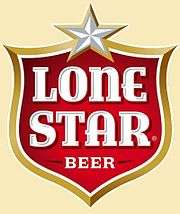Lone Star Brewing Company
 | |
| Industry | Alcoholic beverage |
|---|---|
| Founded | 1884 |
| Founder | Adolphus Busch |
| Headquarters | San Antonio, Texas, United States |
| Products | Beer |
| Owner | Pabst Brewing Company |
The Lone Star Brewery, built in 1884, was the first large mechanized brewery in Texas. Adolphus Busch, of Anheuser-Busch, founded it along with a group of San Antonio businessmen. The castle-like building now houses the San Antonio Museum of Art. Lone Star beer was the company's main brand. It was marketed as "The National Beer of Texas." The Lone Star name is now owned by Pabst Brewing Co. Production of Lone Star is currently contracted out to Miller Brewing Company in Fort Worth. The Lone Star name is used in the Philippines under license to Asia Brewery for a brand of light beer.
History
Originally called the Alamo Brewing Company of San Antonio in 1874, the company was purchased by Anheuser-Busch in 1895 at which time it was housed in the Old Lone Star Brewery located on 200 West Jones Avenue. The original Lone Star Bottling Works opened in San Antonio in the 1890s and by 1903 was selling 65,000 barrels of beer annually.
With the end of Prohibition in 1933, a new brewery under the name Sabinas Brewing Company was constructed at 600 Lone Star Boulevard and operated under the Sabinas name until 1939. The company then operated under name to the Champion Brewing Company until 1940, at which time it was purchased by the Muchlebach Brewing Company of Kansas City, Missouri. The company re-branded itself as the Lone Star Brewing Company and began officially producing the first Lone Star Beer that year.[1] The brewery also produced Lone Star Light, low-calorie Lime Lager (1970) & Brut Super Premium (1969).
It wasn't until 1940 that brewer Peter Kreil from Munich created the formula for the first beer to actually be called Lone Star beer. In 1949, under the leadership of Harry Jersig, Lone Star went public. By 1960, the brewery had 651 employees and by 1965, annual sales exceeded 1 million barrels.
Olympia Brewing Co. of Washington bought Lone Star in 1976, and it changed hands again in 1983 when Wisconsin's G. Heileman bought Olympia.
Detroit-based Stroh Brewery Co. then bought Heileman and closed the San Antonio brewery in 1996 moving beer production to Longview, Texas and signaling the end of San Antonio as a major brewing town. Milwaukee-based Pabst bought most of the Stroh brands, including Lone Star, in 1999, and began brewing Lone Star at the San Antonio Pearl Brewery to great fanfare. In 2000, the Pearl Brewery was closed because it was outdated and would have been too expensive to continue to operate or to bring up to date. Production of Lone Star is currently contracted out to non-Pabst owned breweries (e.g. Miller Brewing Company in Fort Worth).
In 1956 the Lone Star Brewery purchased the Buckhorn Saloon & Museum collection. Harry Jersig, President of the brewery and a friend of the Friedrich’s, continued to add to the collection and had a special building erected on the Lone Star grounds to house the collection.
In the '70s, Lone Star's sales benefited from Jerry Retzloff, former marketing and promotions manager for Lone Star Beer and his close association with Willie Nelson, the Austin music scene and their Giant Armadillo. The beer is mentioned frequently in the title track of Red Steagall's 1976 album "Lone Star Beer and Bob Wills Music". In 1999, the company began to sponsor Texas singers and musicians, such as Two Tons of Steel, with the beer's "It's a Texas Thing" advertising campaign.
In popular culture
- Due to similarities, it is believed that Alamo Beer pictured in the television series King of the Hill is an homage to Lone Star.
- JR Ewing is seen at a bar with a bottle of Lone Star in season 12, episode 20 of Dallas. Originally aired March 31st 1989.
- Actor and Country Singer Christian Kane references Lone Star Beer in his song, American Made.
- Lone Star Beer is a central theme of the one-act play "Lone Star" by James McLure.
- Lone Star Beer is featured prominently in the Houston-based film Urban Cowboy of 1980.
- It's also featured in the eighteenth episode of the seventh season of The Big Bang Theory.
- Detective Rust Cohle, played by Matthew McConaughey drinks a six pack during his interview in True Detective. The beer can also be seen numerous times throughout the first season and once in the second season.
- Carter and her friends are seen drinking Lone Star Beer in the third episode of Finding Carter.
- This beer is also presented in almost every bar scene of the sixth season of The Mentalist.
- In the 2014-15 biographic film American Sniper, Chris Kyle and his brother are shown drinking Lone Star, and a case of the beer is shown next to the TV.
In the final season of Mad Man, Episode 7, Don Draper and some veterans are shown drinking Lone Star while retelling war stories.
Images
-
1884 Lone Star Brewery, 200 West Jones Avenue, San Antonio, TX
-
1933 Lone Star Brewery, 600 Lone Star Boulevard, San Antonio, TX
References
- ↑ Moyer, David G. (2009). American Breweries of the Past. AuthorHouse. p. 58. ISBN 978-1438972572.
External links
- Lone Star Beer - Lone Star's Official Site
- Pabst Brewing Company - Current owner of the Lone Star brands.
- 1958 Brewery tour
- The ruins of Lone Star's second brewery
- Photos of Lone Star Hall of Horns circa 1996
- Solutions to Puzzle Caps
- The Lone Star Brewery B. Knightly Development and Construction's website for revitalization of the second brewery.
- The Beer That Made Armadillos Famous
Coordinates: 29°24′08″N 98°29′18″W / 29.402166°N 98.488294°W